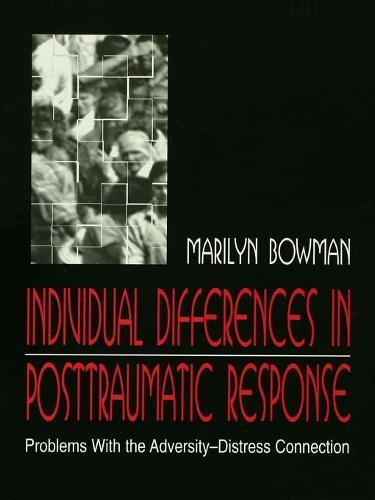Overview
"This text grew out of the author's life-long interest in biographies and her clinical work with people who have suffered bad accidents. Some individuals become significantly disorganized and distressed after what was a minor event by any objective criterion, while others who experience a vastly more terrible event often show a remarkable resilience. In attempting to make sense of this diversity of responses, Bowman studied coping behaviours earlier in her research career. It became clear that long-standing personality styles and beliefs played a powerful moderating role in the relations between objective adversity and apparent distress responses. Despite this evidence, the idea that terrible life events have significant power in affecting mental health has become increasingly popular within professional mental health disciplines and in popular thinking. In particular, the use of the post traumatic distress disorder as a diagnosis has served as a prototype for this thinking, with gradual extension to an ever-wider array of life experiences. Encounters with hundreds of patients over the years, along with research into the connections between stress, coping and distress led Bowman to an increasing concern about the assumptions mental health professionals were using in their clinical work with people seeking help for event-attributed distress. She began to study the evidence concerning the power of life experiences to account for chronic emotional problems that were attributed to these ""stressors"", and discovered that clinical practice was based on an exaggerated idea of the power of life events and a correspondingly significant inattention to pre-existing factors. These factors have been extensively examined in experimental and correlational studies within the fields of stress and coping, in personality studies of emotionality, and in social psychology through studies of attributional processes and their effects on behaviour. The evidence was so compelling about the power of individual differences in accounting for prolonged distress outcomes after ""toxic"" life events that the author found she had to write this book. It represents both a testament to the resilience of those who have been able to surmount horrible experiences, and a different way of thinking about those who find themselves significantly disabled after apparently minor or singular nasty events. This way of rethinking prolonged distress syndromes should help to direct treatment in ways that will be more helpful than the very event-focused treatment models currently used."
Full Product Details
Author: Marilyn L. Bowman
Publisher: Taylor & Francis Inc
Imprint: Routledge
Dimensions:
Width: 15.20cm
, Height: 1.80cm
, Length: 22.90cm
Weight: 0.530kg
ISBN: 9780805827132
ISBN 10: 0805827137
Pages: 198
Publication Date: 01 July 1997
Audience:
College/higher education
,
Professional and scholarly
,
Undergraduate
,
Postgraduate, Research & Scholarly
Format: Hardback
Publisher's Status: Active
Availability: In Print

This item will be ordered in for you from one of our suppliers. Upon receipt, we will promptly dispatch it out to you. For in store availability, please contact us.
Reviews
This interesting and well-researched book will challenge researchers and clinicians as it raises fundamental questions about the nature of PTSD. -Readings ...a useful guide to the literature for those genuinely interested in the field and an important contribution in the effort to find a firm theoretical footing for future clinical work. -Contemporary Psychology Sometimes psychological theories drive us in wrong directions. Marilyn Bowman has now posted some clear signs that cannot be ignored. Every corner of her book re-interprets familiar landscapes on the basis of solid research. But far from being an intellectual exercise, she takes us on an exciting journey down the rapids of life. When I finished reading, nearly every page of my review manuscript was ablaze with highlighter. -Loren Pankratz, Ph.D., Oregon Health Sciences University Tightly argued and exhaustively researched, this book shatters many popular notions about posttraumatic stress disorder. Through numerous lines of evidence, Bowman shows that we greatly overestimate the ability of traumatic events to cause lasting psychological distress, and similarly exaggerate the efficacy of psychotherapy for trauma victims. Every professional who deals with trauma should read this outstanding volume. -Harrison G. Pope, Jr., MD, Harvard Medical School




